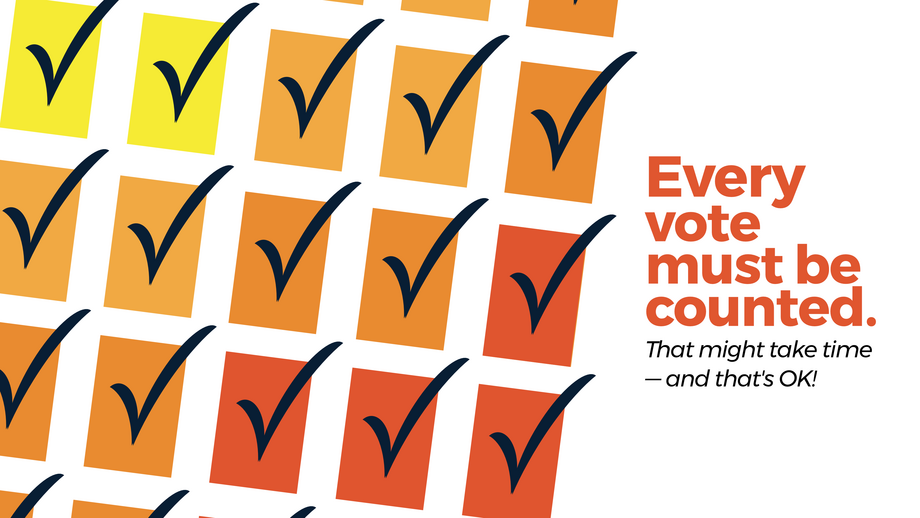Reforming the Electoral Count Act
Updated 11/27/2023.
Congress attached legislation to update how votes are counted and cast by the Electoral College to the omnibus appropriations bill that passed in the final days of the 117th Congress.
This legislation was developed by a bipartisan group of Senators, including Senators Joe Manchin (D-WV) and Susan Collins (R-ME). By offering guardrails that govern how the presidential election results get from the states to the Electoral College and then to Congress, as well as its governing process, the legislation seeks to clarify ambiguities in the previous law.
Before the passage of the Electoral Count Reform Act, or ECRA, this process was governed by a law passed in 1887 called the Electoral Count Act (ECA). The ECA set up a formal counting procedure for electoral votes following the 1876 presidential election, which saw states submit multiple slates of electors and where a deadlock in electoral votes left Congress unable to resolve the election for several weeks. The 1880 and 1884 elections that followed were also close and forced Congress to put legislation that would put procedures in place to resolve future election disputes.
How the ECA was Used to Challenge the 2020 Election
Fast forward to 2021, when lawyers and supporters of former President Trump attempted to use the ECA’s ambiguities to challenge the results of the 2020 election. The loopholes they tried to exploit included persuading Vice President Pence to throw out electors' votes and recruiting slates of “fake electors” from states where Joe Biden had been declared the winner and the electoral slate had been certified in his favor.
These constitutional and political challenges all played out while thousands of insurrectionists rioted at the US Capitol, broke into the chambers of the US House and Senate, and threatened the lives of members of Congress.
Support our work to preserve safe and accessible elections for all voters
Congress’ Plans to Reform the ECA
The Senate Bill
In January 2022, a bipartisan group of Senators came together to discuss multiple issues surrounding the 2020 election, including threats to election workers, election administration reforms, and the Electoral Count Act. The group met for months to draft language and come to an agreement around reforms that could move forward in an equally divided US Senate.
In July 2022, legislation led by Senators Collins and Manchin and cosponsored by a bipartisan group of 14 additional Senators, now known as the Electoral Count Reform and Presidential Transition Act, was introduced. The legislation quickly moved to a hearing in the Senate Rules Committee, where it was discussed by constitutional scholars and civil rights advocates. After the hearing, more Senators added their names as cosponsors, bringing the bill up to 32 cosponsors (15 Republicans and 16 Democrats).
In September, the legislation was marked up in committee, and Senators voted 14-1 to discharge the bill from committee.
The House Bill
The House bill, the Presidential Election Reform Act (PERA), is sponsored by Representatives Lofgren and Cheney. They also serve on the Special Committee investigating the January 6 attack on the Capitol. Their legislation was quickly introduced in September and moved immediately to the floor of the House, where it passed with the support of all Democrats in the House and nine Republican members.

Breaking Down the Changes Established by the ECRA
The Senate and the House versions of the legislation had similarities and differences. But ultimately, here is an overview of the provisions that passed:
-
Clarifies the role of the President of the Senate (Vice President): The law says that the job of the President of the Senate, who is the presiding officer during the counting of electoral votes, is purely ministerial. The President of the Senate or sitting Vice President “cannot accept, reject, or otherwise adjudicate or resolve disputes” over the validity of electors or their votes.
-
Requires electors to be appointed on Election Day: Each bill clearly states that the electors are appointed on Election Day (“the Tuesday next after the first Monday in November in every fourth year”).
-
Clarifies the process by which state officials send their results to Congress: The bills ensure that state executives or governors must certify electors and send them to Congress. It also provides that Congress treats the certification as “conclusive” unless a court modifies it.
-
Defines the role of federal courts in certifying election results: The bills establish a process where candidates for President or Vice President can bring forth claims that arise under the Constitution or laws of the United States concerning the issuance of the certification of electors or the transmission of the certification to a three-judge panel, at the district court level. That panel's decision can be reviewed directly by the US Supreme Court. A final order of the court on or before the day before the date that the Electoral College is designated to meet.
-
Raises the threshold for objections by members of Congress: Under the previous law, objections to electoral votes could be made with the signature of one Senator and one representative. The updated law now requires a higher threshold of one-fifth of the House and Senate members to object to a slate of electors. The objection must be in writing and must clearly state the grounds for objection, which can only be made if the electors were not lawfully certified or the vote of one or more electors were not “regularly given.”
-
Clarifies how the winner of the Electoral College is calculated: The legislation clarifies the calculation of the majority of electors if some states fail to appoint allotted electors or if Congress rejects electoral votes.
Ultimately, the bill was added to the omnibus spending bill passed in December 2022.
Next Steps and Voting Rights Reforms
Reform of the Electoral Count Act was vital to ensuring the peaceful transition of presidential power. The League welcomes lawmakers' efforts to move forward with this legislation. We cannot have another event like the one on January 6, 2021. This legislation will help to ensure that bad actors do not try to exploit loopholes to challenge the final votes of the Electoral College.
At the same time, this legislation is not a substitute for the legislation needed to ensure that the right to vote for all Americans is protected. Since the Supreme Court gutted the heart of the Voting Rights Act in 2013, legislatures and state executives have tried to change the voting rules, especially for communities of color across the country. Federal legislation that restores the Voting Rights Act, like the John Lewis Voting Rights Advancement Act, and legislation that establishes national standards for voting, like the Freedom to Vote Act, is still needed. The League will continue to fight for voters at all levels of government by pushing for pro-voter reforms, fighting discriminatory voting changes, and pushing to ensure every voter has the freedom to vote.
Tell Your Representatives to Pass the John Lewis Voting Rights Advancement Act
The Latest from the League
WASHINGTON — Today the League of Women Voters of the United States CEO Virginia Kase Solomón issued the following statement in response to the Senate’s bipartisan deal on the Electoral Count Reform Act:
Today the League of Women Voters of the United States CEO Virginia Kase Solomón issued the following statement as the bipartisan House Select Committee to Investigate the January 6th attack on the US Capitol hearings begin:
Every four years, the Electoral College, a little-known feature of our Constitution, enjoys a fleeting movement of fame. About six weeks after the long grind of the presidential election is over, the 538 college members meet in their respective states to perform their sole constitutional function: to elect the President and Vice-President of the United States.
But the impact of the college on presidential elections is far greater — and more controversial —than its brief life indicates.
Sign Up For Email
Keep up with the League. Receive emails to your inbox!
Donate to support our work
to empower voters and defend democracy.





